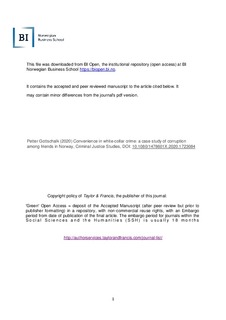Convenience in white-collar crime: A case study of corruption among friends in Norway
Journal article, Peer reviewed
Accepted version
Permanent lenke
http://hdl.handle.net/11250/2639816Utgivelsesdato
2020Metadata
Vis full innførselSamlinger
- Publikasjoner fra CRIStin - BI [1015]
- Scientific articles [2181]
Sammendrag
The theory of convenience is an emerging approach to explain the occurrence of white-collar crime. Convenience theory suggests that there is a financial motive enabling the offender to exploit possibilities and avoid threats, an organizational opportunity to commit and conceal crime, and a personal willingness for deviant behavior. This article tests the theory by a case study of a logistics manager who entered into corrupt relationships with friends who were suppliers. Among the many themes included in the structural model of convenience theory, the case study illustrates occupational rather than corporate crime that benefitted the offender personally. The motive was greed, while the opportunity was caused by status and lack of oversight and guardianship. His willingness was based on his choice of private relationships where he could justify his actions and neutralize feelings of guilt.
